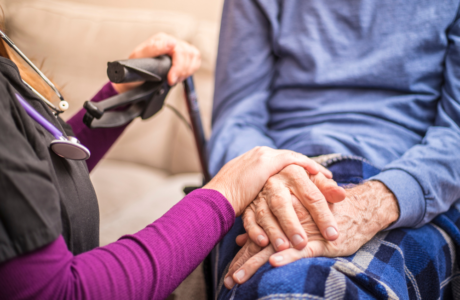
Who will provide your End of Life care?
The end-of-life journey is an experience filled with complex emotions, difficult decisions, and the need for comprehensive care. When facing this stage, it’s crucial to understand the available options in order to choose the approach that aligns with your values and desires. In this blog, we’ll explore different avenues of end-of-life care, including hospice, palliative care programs, death doulas, and Empowered Endings’ own offering, to help you make informed decisions and ensure a compassionate and empowered ending.
Hospice Care
Hospice care is a Medicare and insurance benefit designed to support terminally ill patients and their families. When provided appropriately, hospice care can offer valuable assistance during the final stage of life. However, it’s important to approach this care option with a clear understanding of its limitations. Hospice agencies have financial constraints that may prevent them from offering certain treatments or services that could significantly improve a patient’s quality of life. While hospice provides regular nursing visits, social worker support, and some medications and medical equipment, it typically doesn’t offer services like physical therapy, occupational therapy, or nutritional support. Additionally, patients may lose their established relationship with their Primary Care Physician, as hospice assigns a doctor affiliated with the agency. This lack of direct physician involvement can be a source of anxiety and distress for some individuals and their families.
Palliative Care Programs
Palliative care focuses on improving the quality of life for individuals facing serious illnesses, regardless of prognosis. It addresses physical, spiritual, and psychosocial aspects, aiming to alleviate symptoms and provide support in decision-making. Palliative care can be accessed by anyone, no matter their of age or condition, and can be particularly beneficial for those with complex or chronic illnesses. While most hospitals have palliative care teams that consult on inpatient cases, there are also outpatient clinics and community-based programs available. It’s important to note that Medicare and insurance plans typically only cover physician visits in palliative care, limiting access to additional support from nurses, social workers, and spiritual counselors.
Death Doulas
A relatively new movement in end-of-life care, death doulas (also known as end-of-life guides), offer specialized support to individuals and their loved ones throughout the dying process. These compassionate professionals provide guidance, emotional support, and facilitate discussions around various aspects of death, including legacy projects, rituals, and different types of burials. Death doulas understand the intricacies of the dying process and strive to ensure individuals feel heard, held, and whole during their journey.
Empowered Endings
Empowered Endings Medical Group (EEMG) represents a unique and comprehensive approach to end-of-life care. By combining the expertise of palliative care and hospice physicians with care coordination, support from doulas and social workers, and a team of holistic therapists, Empowered Endings provides the highest level of comfort and support to individuals facing complex and terminal illnesses. Unlike traditional hospice care, EEMG engages expert physicians who remain actively involved in the patient’s care, while also offering tailored support and guidance. The focus is on complementing existing care and providing holistic therapies to enhance physical comfort and improve overall quality of life.
The decision regarding end-of-life care is deeply personal and should be made based on individual circumstances and preferences. It’s crucial to have open and in-depth conversations with potential providers to ensure a clear understanding of the services offered and align them with your own needs and goals. The goal of Empowered Endings and similar models is to rewrite the narrative surrounding death, promoting a compassionate, informed, and empowered ending that honors the individual’s choices and dignity.
Remember, when facing end-of-life decisions, you have the power to write your final chapter. Feel free to reach out to Empowered Endings at any time to discuss your options.





